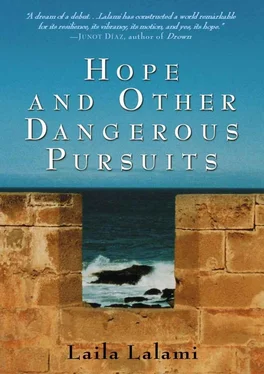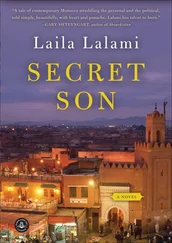“He drank the rent money.” Halima took off her jellaba, revealing her paisley-print dress and the blue belt encircling her small waist. She was twenty-nine, but the dark patches on her face and the stoop in her shoulders made her look much older. She sat down on a stool and let her chin rest in her hands.
Fatiha lit the Butagaz and put a kettle on it. “The Lord is with those who are patient,” she said.
Halima wondered whether all the Lord ever wanted from His people was patience. Hadn’t she suffered long enough? She was sure that the Lord also wanted His people to be happy, but she couldn’t come up with a stock expression as a retort, the way her mother always did.
The kettle whistled. Fatiha made a pot of mint tea and served it on the low, round table. Halima took her glass and cradled it in her chapped hands. “If I don’t give him money for drinking, he steals it from me.”
“A woman must know how to handle her husband,” Fatiha said reproachfully. She sat down, her ample bottom spilling over the sides of her chair. “Look, I’m going to get you a little something from a new sorceress I went to the other day. Make sure you put it in Maati’s food this time. He’ll become like a ring on your finger. You can turn it any way you want.”
“Your magic doesn’t work.”
“That’s because you don’t follow my directions.”
“I want a divorce.”
Fatiha slapped her hand on her thigh, spilling tea on the table. “Curse Satan,” she said. “How are you going to feed the children?” She wiped off the spilled tea with a wet rag.
“I already do. Do you think they can be fed on what he gives me?”
Maati made a living driving a cab for a businessman uptown, but there was little of it left by the time his bar tab was paid. Halima had taken janitorial jobs two days a week and made extra money by selling embroidery to neighbors and friends. She looked at her mother with mixed defiance and expectation.
“Child, be patient with your man,” Fatiha said. “Look what happened to Hadda.” Hadda was Halima’s neighbor in the Zenata shanty. Her husband had taken up with another woman but refused to divorce her. She’d gone to court, but he hadn’t shown up at any of the hearings. “Now she lives alone. She’s neither married, really, nor free to remarry.”
“Better than living with the son of a whore.”
“See? This is why he beats you. You talk back.”
Halima heaved a loud sigh, but her mother was unfazed. Fatiha got up and wiped off the new microwave that her sons had brought her on their latest visit. She readjusted the embroidered doily that she kept on top.
“I’m not like Hadda,” Halima said.
“That’s right,” Fatiha said. “You’ve got children.”
Halima undid her hair and nervously tied it up in a knot. She refilled her mother’s glass. “How much did that sorceress of yours want?”
“Fifteen hundred dirhams,” Fatiha said.
Halima chuckled. “I might as well give Maati the money. I could buy my divorce from him.”
“Even if you do,” Fatiha said, “he won’t let you have the children.”
Halima gnawed at her thumb. “Then I’ll bribe the judge,” she said, her chin raised. She waited to see if her mother would say something, would discredit this idea as she had all the others.
Fatiha snorted. “You couldn’t bribe a lowly clerk for that much.”
Halima stared ahead of her, resisting the tears that she felt were coming.
“Let me take you to this sorceress,” Fatiha said softly. “What do you have to lose?” Halima looked at her mother’s face, at the sudden and gentle turn that her lips had taken, and wondered whom she should trust, the courts or the magicians.
IT TOOK SEVERAL WEEKS and another three beatings, the most recent only yesterday, before Halima managed to save the money to visit the sorceress her mother had recommended. She rode the bus back to Zenata and made it home in time to prepare the evening meal. She was going to make rghaif. The batter would be perfect for dissolving the pinch of powder that the sorceress had sold her. As Halima kneaded the dough, she heard the sound of the muezzins exhorting the faithful for the afternoon prayer. She winced at the thought of what she was about to do: a grave sin it was, the use of sorcerers. Nevertheless, the money was already spent, and if indeed actions were judged by one’s niyyah, then she had already sinned by intending to use sorcery, so she might as well go through with it. As soon as the first rghifa was ready, she tasted it, burning her tongue in the process. The powder made it look yellowish, but the taste didn’t appear to be altered. She grilled the rest of the rghaif and prepared a pot of tea, a strong one, with more tea and less mint, just the way Maati liked it.
She unhooked the clothes from the line in the courtyard and took them into the only bedroom, a dark, humid space without windows. She put them away in the armoire that was tipped against the naked cement wall because of its wobbly legs, straightening the sheet that separated her bed from the children’s as she walked out. She went to the kitchen and rolled the round table on its edge, setting it down in the courtyard, between the divan and the car seats the children had rescued from the trash heap a few blocks down. When it rained, the family had to eat in the kitchen, elbow to elbow on the cane mat, but today it was sunny and they could eat their dinner by daylight. No need to use the gas lamp.
Halima’s daughter, Mouna, was the first to come home, her braids swinging on both sides of her head as she pushed the metal door open. Halima caught her breath. With her high forehead and aquiline nose, Mouna looked so much like her father. Mouna asked if she could go to the neighbor’s house for dinner. Halima slipped her arm around her daughter’s waist. “Stay here with me,” she said.
“Can we eat dinner now, then?” Mouna asked, in a whining tone.
“We have to wait for your father.”
Mouna sighed, loudly, dramatically. The boys had gotten unruly — lately Farid had started talking back — but, Halima thought, Mouna was a good child, she would go far. She could have everything Halima had wanted for herself — if only the family could get out of the shanty-town, with its dirty alleys where teenagers sniffed glue by day and roamed around in bands at night.
Mouna’s younger brothers, Farid and Amin, walked in and dropped their schoolbags on the floor. The three children decided on a game of cards. “Don’t cheat,” warned Amin, the youngest. They sat on the ground in a patch of sunlight and started to play. Above them, flies danced in a never-ending circle.
For days after he beat Halima, Maati would sulk. Hours would go by, she’d wait for him to apologize or at least speak to her; but he never did, and she’d give up waiting and end up trying to console him, as though he were the one who’d been beaten. But tonight he came home with an apologetic look on his face. He let her sit on the divan with the children and took a car seat for himself, then served the tea. Halima watched as he ate his rghaif, finishing each one in only three bites. One thing that could be said for him was that he had a healthy appetite. If only he’d help out instead of drinking his money and eating hers. “These are delicious,” he said, a smile on his face.
After dinner Halima cleared the table and sent the children to play outside. She was at the kitchen sink when Maati came up behind her, wrapping one arm around her shoulders. He kissed her neck and she felt it burn with heat. He still had that effect on her, even after ten years of marriage. When they had met at a neighbor’s wedding, she’d immediately been attracted to his magnetic eyes, to his body, so thin yet full of pent-up energy. They had married only weeks later and had three children in four years before Halima went to the family planning clinic and got the Pill.
Читать дальше












